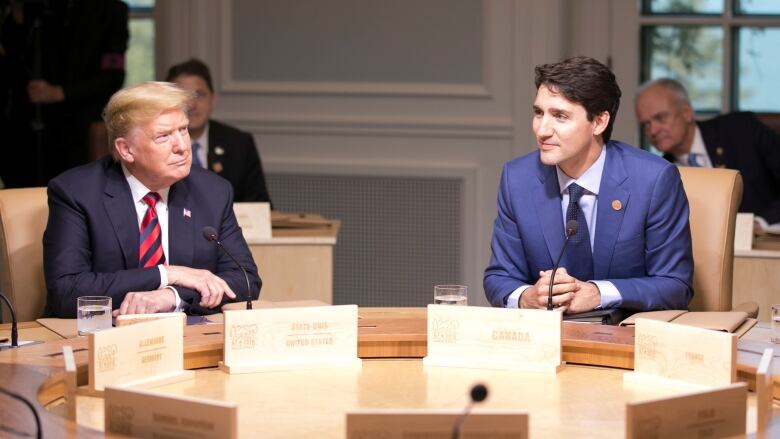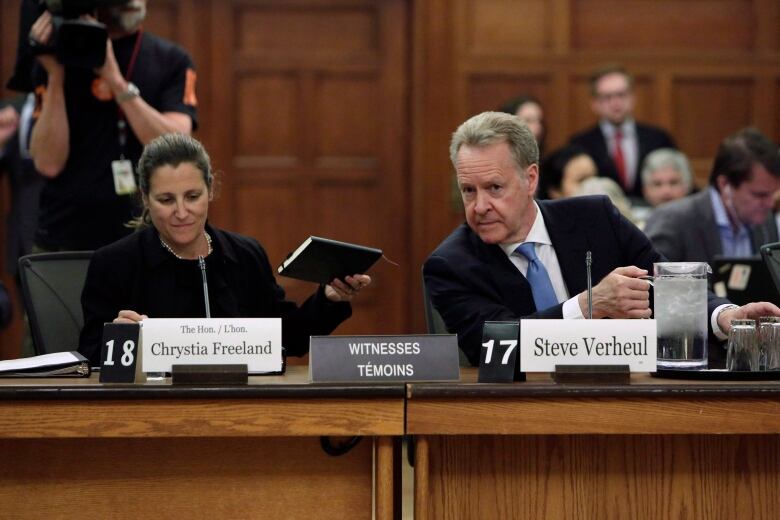Fake deadlines and 'cautious optimism': reading trade news with a skeptical eye
You can't always know what you want to know - and other awkward truths about trade reporting

There they go again another wave of news headlines proclaiming the possibility of aNAFTAdeal "soon." Maybe even bythe end of August.
We've seen this movie before.
Remember when a "modernized"North American Free Trade Agreement was going to beready by last spring, before Mexico's presidential elections? In time for the current U.S. Congress to approve it?
Well, fool me once. But not twice, right? BecauseSeptember headlines predicteda deal by December. Then, in December, they were promising a deal by March.
"Convince me that progress has been made. Then I'll believe it," said Simon Lester, an associate director in trade policy studies at Washington's Cato Institute.
He judges the seriousness of a story by its substantive policy details. If there aren't any, he said, it's not serious.
By his reckoning, little has changed on the NAFTAfile since last fall.
"When they say things like, 'We've closed nine of thirtychapters,' that's irrelevant," he said. "A lot of these chapters are meaningless ...boilerplate copied over from other agreements.
"Politicians have a reason for talking up possible deals. Like, 'Hey, success is coming!'"
Politicians know that if they admit things aren't ticking along smoothly, they'll beaccused of incompetence. They sure don't want that.
Instead, said Lester, they say they're "about to get something done" but"that's all they can tell us at this point, because they haven't gotten anything done."
The danger in all this happy talk is, of course, that Canadians' cynicism will grow, that their faith in the promise of a successful trade deal will fade and their suspicion that they're being taken for a ride will deepen.
'Hopes and dreams'
"I followed the [World Trade Organization]'s Doha Round, and those headlines were constant ... the leaders are feeling good about this round, or that one," said Todd Tucker, who studies trade agreements and law at the Roosevelt Institute in New York. "Fifteen years later and there's still no Doha Round [deal], right?"
This practice of ramping up expectations before dashing them is part ofwhat propelled the election of Donald Trump, he said.
"Here's a businessperson that says these government bureaucrats don't know what they're doing, so put a business guy in there who's used to closing deals and he'll make it go fast," he said. But it's "much harder to close deals when it's countries negotiating, not businesses."
Trade negotiators also like telling 'hopes and dreams' stories because theyput pressure on the person acrossthe table to stop holding out.
"You don't want to be the one country that blew up a really good trade deal," Tuckersaid.

Typically, democracies don't negotiate trade deals in full view of the public. They're too complicated.
"Somebody's future is getting traded off against somebody's opportunity," Tuckersaid. "If all of that was on the table, you probably wouldn't have a trade agreement, full stop."
Of course, all those vague statements from trade negotiators expressing "cautious optimism" might be more of a side effect of the work itself than a calculated attempt to snow the voting public.If negotiators don't believe a deal is possible, even probable, why would they carryon?
"Except in a rare circumstance when you're actually delivering a threat a strategically-timed threat can unblock negotiations in general there's nopoint in talking if there's not at least some grounds for optimism," Tucker said.
'Shred the calendar'
Trade consultant Adam Taylor of Ottawa-based Export Action Global was a communications adviser to Conservative trade minister Ed Fast. He said hisnumber one rule is to never refer to timelines.
"Shred the calendar," he said. "You will miss that deadline you impose ten times out of nine and you box yourself in." Opponents, he said, see the pressure you're under, which only weakens your position.
When politicians say they hopeto get a deal "soon," it's a "box-checking exercise" a bid to survive another news cycle, he said.
"You need your two cents in those stories," to be visible, he said.
So why doesn't anyone at the table for these trade talks say something relevant like, for example,confirming something to which both sides have agreed?
You want to "save the fireworks" for the finished deal, Taylor said. Something might still change before the deal gets signed, after all, and you don't want to trigger hard feelings earlier than necessary.
So how can outside observers know when a trade negotiation isgetting serious? Watch for meetings that involve both politicians and the leadnegotiators, Taylor said: when important things are decided politically, negotiators need to be in the room so it can be put into the draft negotiating text.
But whenthere is movement behind closed doors, negotiators have fewincentives to say sounless a strategic leak could rile up the right people and trigger concessions. Any stakeholders they're briefing regularly probably have signed non-disclosure agreements, as Canada's governmentrequiresforNAFTArounds.
As we get to the final strokes, its especially important that you consider the source of insider info and think hard about context before jumping to conclusions.
Statements made off the record are sometimes tactical moves made by negotiators and sometimes just gossip. /4
—@FlavioVolpe1"These three governments are keeping things close to the vest. Everything non-official is most likely noise," said MonaPinchis-Paulsen, a Canadian lawyer and a post-doctoral fellow atthe Jean Monnet Center, New York University.
"I think it's interesting when a business or industry interest group or association puts something 'official'to the public, making their view or position known, because it signals what they are worried about."
It's a clichto say that'nothing's concluded until everything's concluded'.But it's still true and it can makefor longstretches of empty reporting.
'Optimism is political power'
When U.S. President Donald Trump announced his"very big" deal with the European Union, he wasn't the only one eager to see somethingaccomplished, even if it lacked substance.
"It was an optimistic deal in a very dark time," said ShannonTogawaMercer, anational security and law associate at the Hoover Institution and a senior editor at theLawfareblog."Optimism is political power."
Both politicians and the media had an interest in playing it up, she said. Politicians needed to createmomentum to fix the U.S.-EU trade relationship andobscure itspast failures. Media outlets needed to balance their coverage, she said, and "bring people some joy, which is marketable."
"The more difficult it gets, the more important it is to be positive outwardly while you deal with all the intricacies."
The Trump administrationis a moving target, with regular reports of infighting among advisers. "There's no unitary approach to trade policy at this stage," Mercersaid.
So for each Trump official quoted in a story, you have to consider the motivations of their agency, their personal background and the coziness of their relationships with the boss. "You're hearing a thousand different perspectives," she said.
'Good government people' don't talk?
Recently, reports quotedunnamed sources sayingForeign Affairs MinisterChrystiaFreelandhad asked to joinNAFTAtalks planned between the U.S. and Mexico last week, but was turned awayto pressure her governmentto concede something.
Sounds serious, right?But there's a whiff of manurein the air, andit's not coming from Canada's supply-manageddairy cattle.
Was there afalling out betweenFreelandand U.S. Trade Representative RobertLighthizer?
No, his office subsequently told reporters: he has "great respect for MinisterFreelandand considers her a good friend."
Was this a plot to cut out Canada?
Nice try, four U.S congressmen immediately toldLighthizerin a letter:Congress hasn't authorized the negotiation of a bilateral U.S.Mexico deal, so stick to revisingNAFTA, sir.

So what the heck'sgoing on?
"It's possible that the U.S. administration is trying to make Canada nervous about this and therefore offer more concessions," Lestersaid. "I don't think Canada's falling for it."
In fact, the rumoured agenda for last week's meetings revisedrules for definingtariff-free "North American" vehicle content is "pretty much a U.S.Mexico issue" they need to hammer out between themselves, the CATO director said.
"To me, the good government people are not going to be talking about any of this," hesaid.
"I can tell you first-hand that bilateral talks in multiparty talks are very, very normal," Taylor said, calling this "probably a non-story.
"I wouldn't be surprised if creating negative impressions of Canada and putting us on the defensive in hopes that we'll make concessions is part of the game plan of the U.S. The Europeans tried to do the same thing with us."
As far as anyone knows, the talks haven't gotten around to agriculture issuesyet, where Canada'sunder pressure.
Expect to hear more about those cattle. Soon.












_(720p).jpg)


 OFFICIAL HD MUSIC VIDEO.jpg)
.jpg)



























































































